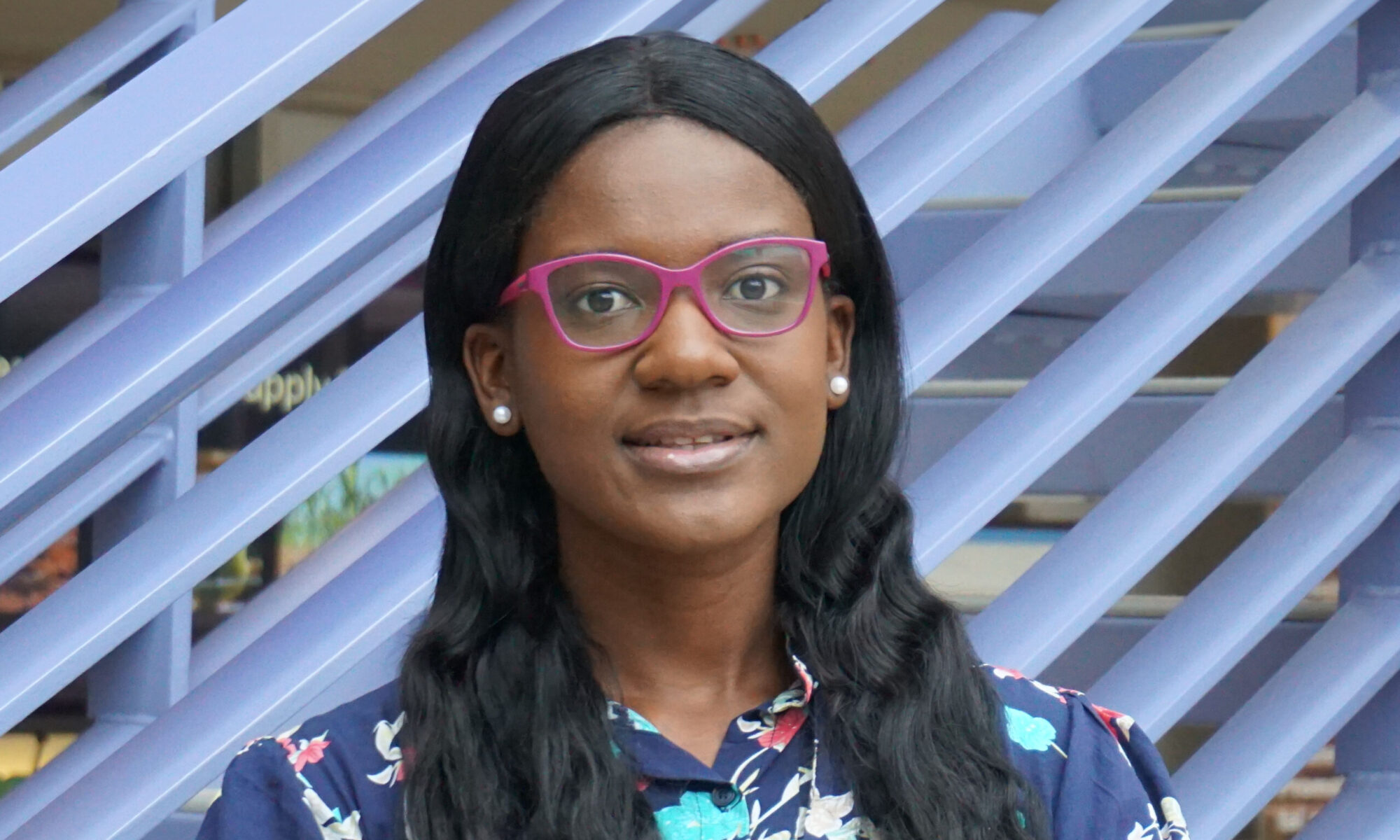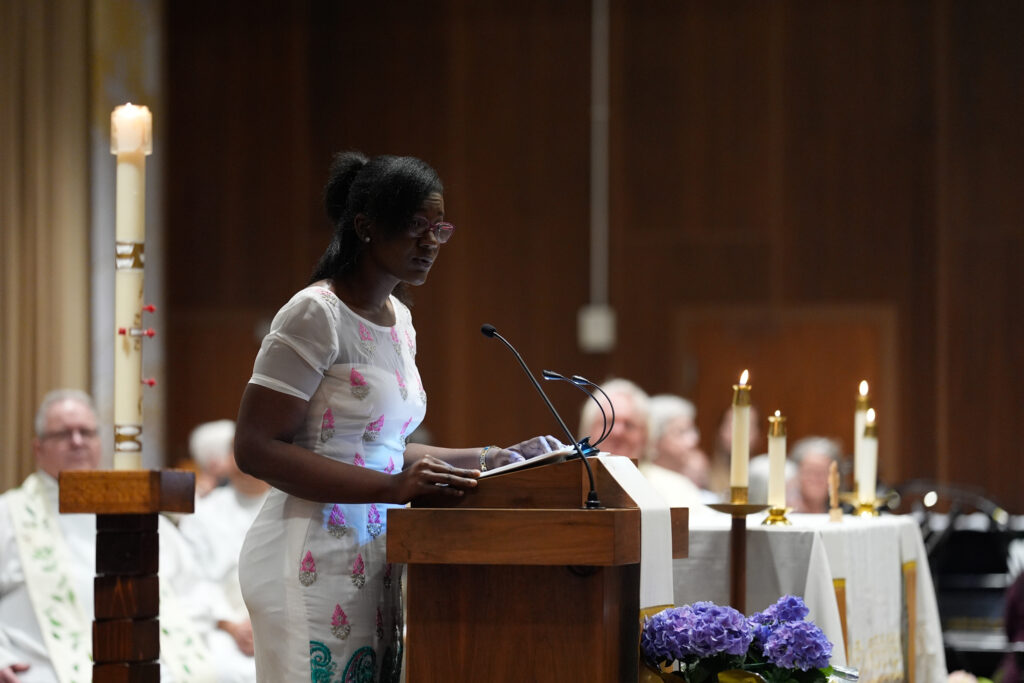
At a young age, Michelle Odoi developed a passion for agriculture, which has taken her across the globe. Odoi began her academic journey at the University of Ghana, where she earned a bachelor’s degree in crop science and worked as a research assistant, engaging deeply with students and rural farming communities. Seeking to further her knowledge, Odoi undertook a three-month internship in the Netherlands before pursuing her master’s degree in Germany.
With her recent completion of a PhD in entomology, plant pathology, and nematology with a concentration in bioinformatics, genomics, and molecular interactions, Odoi reflects on her research and experiences that shaped her academic and professional trajectory, including her role as a postdoctoral research associate at Oregon State University.
Q&A with Michelle Odoi
Can you tell me a little bit about yourself?
I am Michelle Esther Odoi from Ghana in West Africa. My academic and professional journey can be viewed through the lenses of diverse continents of Africa, Europe, and North America. My educational background stems from Ghana where I obtained a Bachelor of Science degree in Crop Science from the University of Ghana. After my undergraduate studies, I worked as a research assistant at the Crop Science Department of the University of Ghana, where I provided teaching, research and outreach support to students and rural farming communities.
In the quest to obtain international industrial experience, I was awarded a three-month internship in the Netherlands with MDK Flower and Green. Subsequently, I was awarded the DAAD (Deutscher Akademischer Austauschdienst) scholarship to pursue a Master of Science degree in International Horticulture at Leibniz University of Hannover Germany. After my master’s, I obtained USDA (United States Department of Agriculture) funding for a doctoral in entomology, plant pathology, and nematology from the University of Tennessee, Knoxville, which I completed and graduated in May 2024.
What was your concentration?
My concentration was bioinformatics, genomics and molecular interactions.
What academic class was your favorite and why?
The bioinformatics class taught by Dr. Meg Staton was my favorite because it was an excellent introduction to computational biology that propelled my interest in bioinformatics.
How has your academic training at The University of Tennessee prepared you for a career?
My training at UT has enabled me to discover my untapped potential. I am now enthused about pursuing a career in academia.
What was your research question?
- The microbiome associated with Helianthus verticillatus – small, an endangered ornamental sunflower in urban landscapes.
- Population diversity and spatial structure of Coleus rotundifolius Poir, Frafra potato, an underutilized, climate-smart food security crop collected from Ghana and Burkina Faso
What were the primary obstacles in answering this question?
I did not face obstacles per se. I see my journey as a steep and extremely exciting one, from not having a background in bioinformatics to successfully analyzing my data using advanced genomics, bioinformatics and conducting full-scale microbiome research.
Can you tell me more about your research?
In the global event of climate change and rapid urbanization, my research furthered our understanding of the impact of habitat loss on native ornamental and food crops. Plant and soil microbial interactions have been found in forests and managed ecosystems to aid in plants coping with anthropogenic disturbances and plant disease outbreaks. However, we have a limited understanding of how ornamental plant microbiome assemblages, including the understudied flower microbiome, vary across local geographical scales and how environmental factors, such as soil physicochemical properties, drive local variation.
To address this knowledge gap, I used amplicon sequencing to characterize the composition of archaeal/bacterial and fungal communities associated with the above and below-ground sections of a genetically uniform H. verticillatus cultivar ‘Denita’s Autumn Sunshine’ at three urban monitoring sites in Knoxville, Tennessee, U.S.A. Additionally, I characterized the fungal community compositions residing inside the leaves of H. verticillatus, using a growth media. Most of the variation in microbial communities was driven by differences in soil physicochemical properties across the three urban landscapes.

For my second study, I characterized the population diversity and spatial structure of Coleus rotundifolius Poir, Frafra potato, an underutilized, climate-smart food security crop collected from Ghana and Burkina Faso. My results showed low genetic variation with a high inbreeding coefficient, low genetic differentiation, and weak population structure in the Frafra potato from Northern Ghana and Burkina Faso. These findings highlighted an urgent need for genomic resources of orphan crops, which will provide a better resolution to delineate its population diversity to diversify global food systems.
What was the highlight of your graduate school experiences?
My ability to add bioinformatics, genomics, plant pathology, population genetics and microbiome research to my toolbox for a career in academia and my professional development.
What do you believe is your biggest academic achievement?
Obtaining my PhD from the University of Tennessee.
What extracurricular activities did you participate in?
I served as the Awards Chair for the Gamma Sigma Delta honor society. Outside the department, I was also active at the Saint John the XXIII Catholic Church, where I served as a lector, a parish councilor and a member of the decorating team of the parish.
What are your favorite hobbies?
I love going on long walks in nature and listening to gospel music.
What were your favorite things to do on campus?
I enjoyed taking walks in the UT Gardens and on campus. I also enjoyed utilizing the UT Tom Black Track at the LaPorte Stadium on Saturday mornings for my run.
Any advice you would like to share with a prospective student?
“A smooth sea never made a skilled sailor” by Franklin D Roosevelt. See every challenge as an opportunity to advance your academic and professional development.
Is there anything that you would like to add?
GO VOLS!
Written By Teneria Orange


